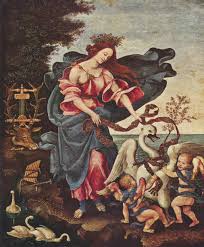记忆方法
1. all- "another" + egor- "speak openly, speak (in the assembly)" + -y.
2. literally "a speaking about something else".
3. => figurative language, description of one thing under the image of another.
4. Allegory:alle-all,gory-格林。全都是格林童话一样的寓言----寓言。
5. Allegory:all-all,e -- 伊索寓言, gory-格林。
2. literally "a speaking about something else".
3. => figurative language, description of one thing under the image of another.
4. Allegory:alle-all,gory-格林。全都是格林童话一样的寓言----寓言。
5. Allegory:all-all,e -- 伊索寓言, gory-格林。
中文词源
allegory 寓言
词根alle, 同al, 异,其它,见else. -egor, 同agora, 广场。原指在公共演讲时的一种讽喻性修辞手法,引申词义寓言,讽喻。
英语词源
- allegory
-
allegory: [14] Etymologically, allegory means ‘speaking otherwise’. It comes from a Greek compound based on allos ‘other’ (which is related to Latin alius, as in English alibi and alias, and to English else) and agoreúein ‘speak publicly’ (derived from agorá ‘(place of) assembly’, which is the source of English agoraphobia and is related to gregarious). Greek allēgorein ‘speak figuratively’ produced the noun allēgorīā, which passed into English via Latin and French.
=> aggregate, agoraphobia, alias, alibi, else, gregarious - allegory (n.)
- late 14c., from Old French allegorie (12c.), from Latin allegoria, from Greek allegoria "figurative language, description of one thing under the image of another," literally "a speaking about something else," from allos "another, different" (see alias (adv.)) + agoreuein "speak openly, speak in the assembly," from agora "assembly" (see agora).
权威例句
- 1. The play is being widely read as an allegory of imperialist conquest.
- 这部剧被广泛解读为对帝国主义征服的讽喻。
- 2. The poem's comic allegory was transparent.
- 该诗的喜剧讽喻法是显而易见的。
- 3. the poet's use of allegory
- 诗人的讽喻手法
- 4. The book is a kind of allegory of Latin American history.
- 这本书是对拉丁美洲历史的一种讽喻。
- 5. The play can be read as allegory.
- 这个剧本可作为寓言阅读。

